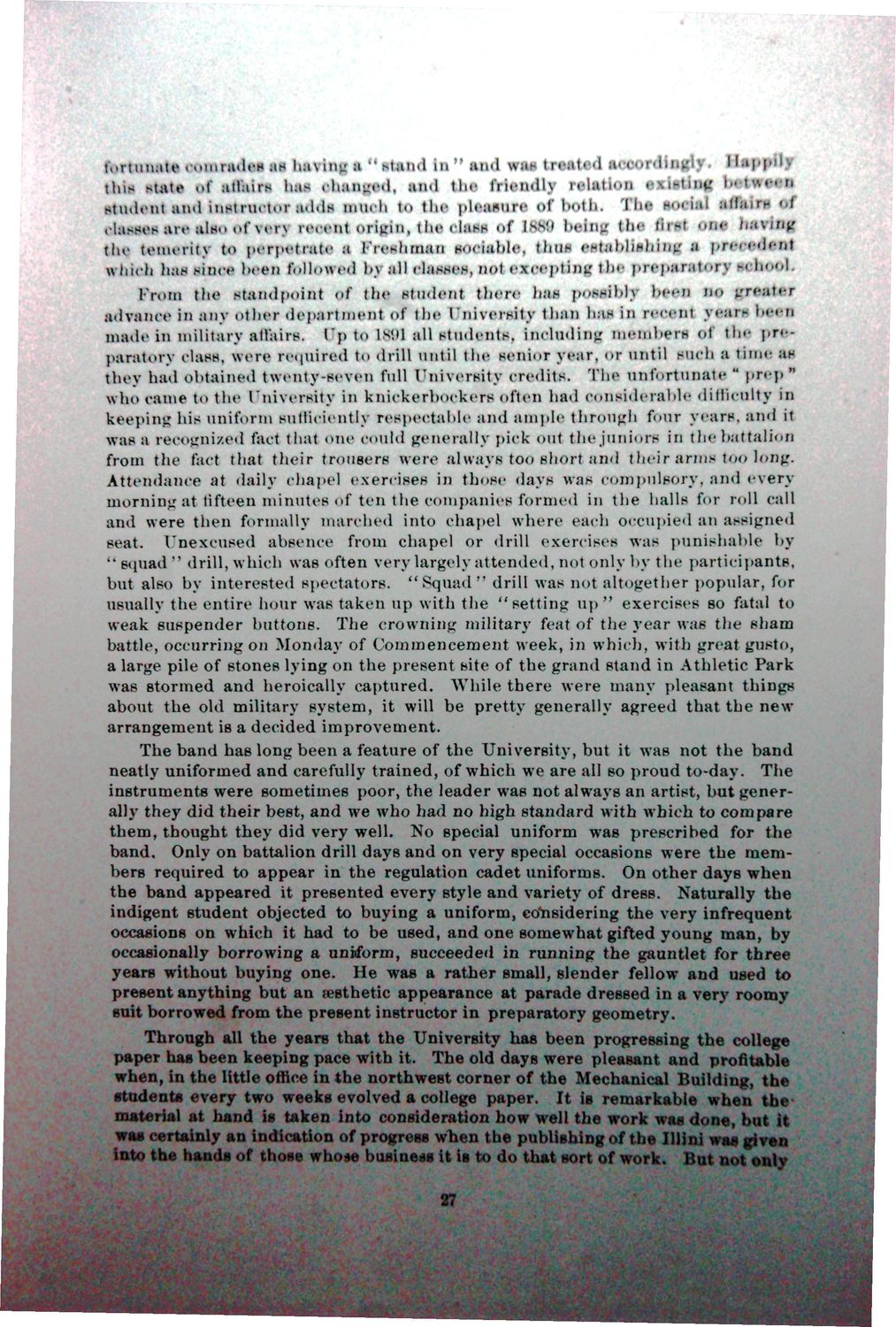| |
| |
Caption: Illio - 1896
This is a reduced-resolution page image for fast online browsing.

EXTRACTED TEXT FROM PAGE:
fortunate comrades as having a " stand in " and wan I rented a-rnnlu.;.^ Ilappdv this state of att'airs has changed, and the friendly relation .-\i-tihg b ' t u e . h student and instructor adds mueh to tlie pleasure of both. The Hoeial affair* of classes are also of \er\ recent origin, the class of lss<> being the lii>t one having the temerity to perpetrate a 1'reshman sociable, thus establishing a precedent which has since been followed b\ all classes, not excepting the preparatory school. Prom the standpoint of the student there has possibly been no greater advance in any other department of the I'niversity than has in recent years been made in military attains. Up to ISM all students, including members of the preparatory class, were required to drill until the senior year, or until such a time as they had obtained twenty-seven full University credits. The unfortunate " p r e p " who came to the University in knickerbockers often had considerable difficulty in keeping his uniform sufficiently respectable and ample through four years, and it was a recognized fact that one could generally pick out thejuniors in the battalion from the fact that their trousers were always too short and their arms too long. Attendance at daily chapel exercises in those days was compulsory, and every morning at fifteen minutes of ten the companies formed in the halls for roll call and were then formally marched into chapel where each occupied an assigned seat. Unexcused absence from chapel or drill exercises was punishable by 11 squad " drill, which was often very largely attended, not only by the participants, but also by interested spectators. " S q u a d " drill was not altogether popular, for usually the entire hour was taken up with the " s e t t i n g u p " exercises so fatal to weak suspender buttons. The crowning military feat of the year was the sham battle, occurring on Monday of Commencement week, in which, with great gusto, a large pile of 6tones lying on the present site of the grand stand in Athletic Park was stormed and heroically captured. While there were many pleasant things about the old military system, it will be pretty generally agreed that the new arrangement is a decided improvement. The band has long been a feature of the University, but it was not the band neatly uniformed and carefully trained, of which we are all so proud to-day. The instruments were sometimes poor, the leader was not always an artist, b u t generally they did their best, and we who had no high standard with which to compare r them, thought they did very well. No special uniform w as prescribed for the band. Only on battalion drill days and on very special occasions were the members required to appear in the regulation cadet uniforms. On other days when the band appeared it presented every style and variety of dress. Naturally the indigent student objected to buying a uniform, considering the very infrequent occasions on which it had to be used, and one somewhat gifted young man, by occasionally borrowing a uniform, succeeded in running the gauntlet for three years without buying one. He was a rather small, slender fellow and used to present anything but an {esthetic appearance at parade dressed in a very roomy suit borrowed from the present instructor in preparatory geometry. Through all the years that the University has been progressing the college paper has been keeping pace with it. The old days were pleasant and profitable when, in the little office in the northwest corner of the Mechanical Building, the student* every two weeks evolved a college paper. It is remarkable when the* material at hand is taken into consideration how well the work was done, but it was certainly an indication of progress when the publishing of the Iliini was given into the hands of those whose business it is to do that sort of work. But not only 27
| |